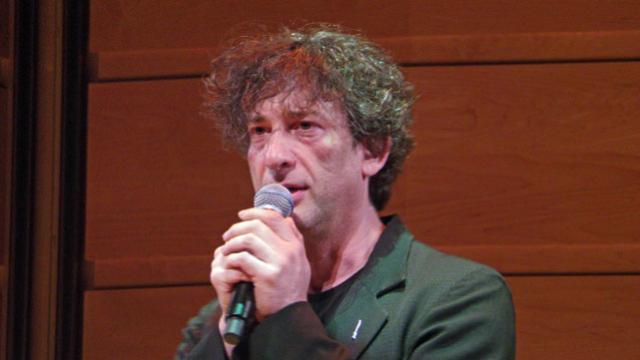Neil Gaiman is an insanely talented writer with much to say on the subject of effective writing, drafting, apologising and, oddly enough (although this is Neil Gaiman) the best way to shave.
Gaiman held a public reading from two of his upcoming works on Friday night in Sydney as part of the Sydney Writer’s Festival; the first two chapters of The Ocean At The End Of The Lane, a dark fantasy tale (due out in June) and a section of Fortunately The Milk, a rollocking tale of time travel, unexpected surprises and . . . milk, due out in October. It’s very Neil Gaiman stuff, essentially. He also performed with string quartet Fourplay — he does a very entertaining turn on the theme for Fireball XL5, captured here at last year’s New Year’s Eve:
It’s even better with strings.
There was also a brief (and intermittently silly) audience Q&A session, which was also where Gaiman revealed why he won’t say anything (aside from “porridge”) about the new Doctor Who episode he wrote for this year’s season. Gaiman is quite active on Twitter, but for this event, all the questions had to be handwritten in advance for him to select from.
Naturally, the subject of writing came up quite a bit; here’s a selection of his insights on the writing process, culled from that Q&A and his earlier pre-reading talk.
On the creative process behind The Ocean At The End Of The Lane when he was in Florida, ostensibly writing American Gods 2 but had a short story unfinished:
I made the mistake of going for a jog. I’m not somebody who goes for jogs. I’m really not. The world is divided into people who run, and people who amble. My wife was in Melbourne making a record, and I was spectacularly grumpy. I started jogging, and I got halfway home, and I thought . . . I know what happens next in that short story. Just to get it down on the page. The next day I wrote what happened next, and then I thought, I should finish this short story, because finishing something always makes me happy. All I have to do is finish this short story, and then I can go in and write American Gods 2. So the next day I wrote the short story. And the next day. And the next day. Somewhere around the middle of that week I thought: ‘it’s not a short story any more’. A couple of weeks later, I thought, well, it’s a novellette.
Two tips for the price of one there: the often-repeated mantra that a change in location can refresh your creativity, alongside the statement that completion of a task can be satisfying in itself, even if you’re not a writer.
On how he writes:
I’d been writing it in handwriting, so I had no idea how long this thing is. I spent the next three or four weeks typing it up, and once it’s typed up, I did a word count. And I sent my editor a note, saying ‘Oh. It’s a novel. I didn’t mean to. I’m really sorry.’ I’m English, and we can apologise as an Olympic sport.
Or in other words, it doesn’t matter whether you handwrite or type — but be prepared to justify it to your editor — or apologise for it profusely after the fact.
On the best piece of writing advice he’s ever received:
Stephen King wrote in Danse Macabre where he said ‘300 words is easy to write. It’s a side of paper. Everybody should be able to write 300 words. One side. And if you do that every day for a year, you have a novel at the end of it.’ At the time, I was 17-18 years old, and the idea of writing a novel seemed absolutely impossible. You’d have to have the thing in your head, and write it one afternoon. The idea that you could just do it 300 words at a time was amazing.
It’s not the best piece of advice I ever received from a writer. That was from Harlan Ellison, about 15 years ago; he came up to me at a convention and said “GAIMAN. WHY THE F*CK DON’T YOU EVER SHAVE?’. I said, I have a really tough beard and sensitive skin, and I don’t like shaving. ‘CONDITIONER. JUST PUT CONDITIONER ON, LEAVE IT ON, WASH IT OFF, SHAVE. WORKS LIKE A F*CKING CHARM.’ And it did.
On uncertainty about writing:
I feel uncertain about my writing all the time. I feel uncertain when I’m writing it, I feel uncertain when I’m editing it, I feel fairly uncertain when I’m sending it off to people, and then round about the point where I start feeling that it might be rather good, suddenly it feels like it was written by a different person a long time ago. If anyone has gone ‘If I was only Neil Gaiman, I’d feel certain about my writing’ then dream on . . .
On whether first or second drafts are more challenging:
First. Second draft is just fixing stuff. Fixing stuff is easy. Fixing stuff is fun. First draft it’s you and a blank sheet of paper. There’s nothing to fix yet, there’s just words that aren’t there yet, and there are characters sitting opposite each other at a table not saying them.

Leave a Reply
You must be logged in to post a comment.